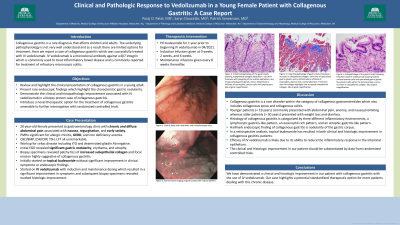Back


Poster Session D - Tuesday Morning
Category: Stomach
D0703 - Clinical and Pathologic Response to Vedolizumab in a Young Female Patient With Collagenous Gastritis
Tuesday, October 25, 2022
10:00 AM – 12:00 PM ET
Location: Crown Ballroom

Has Audio

Paraj Patel, MD
Medical College of Wisconsin Affiliated Hospitals
Milwaukee, WI
Presenting Author(s)
Paraj Patel, MD1, Saryn Doucette, MD2, Patrick Sanvanson, MD2
1Medical College of Wisconsin Affiliated Hospitals, Milwaukee, WI; 2Medical College of Wisconsin, Milwaukee, WI
Introduction: Collagenous gastritis is a rare entity that affects children and adults. The underlying pathophysiology is not well understood and as a result there are limited options for treatment. Here we report a case of collagenous gastritis which was successfully treated with IV vedolizumab.
Case Description/Methods: A 20-year-old female with a past medical history of migraines presented to the gastroenterology clinic with chronic and diffuse abdominal pain with associated nausea, regurgitation, and early satiety. The initial EGD revealed gastric erythema, atrophic gastric body, and significant gastric nodularity. Biopsies revealed patchy foci of increased subepithelial collagen with focal erosion which was suggestive of collagenous gastritis (Figure 1). Patient was started on topical budesonide 9 mg daily as initial treatment. Subsequent EGD revealed similar endoscopic findings as prior with increased gastric subepithelial collagen layer thickening on histology. Given the lack of improvement and persistent symptoms the patient was started on IV vedolizumab with induction and maintenance dosing. EGD following IV vedolizumab showed both histologic and endoscopic improvement (Figure 1). This was also correlated with an improvement in symptoms.
Discussion: Adults with collagenous gastritis usually present with anemia, abdominal pain, and diarrhea. It is categorized by three different inflammatory environments, a lymphocytic gastritis-like pattern, an eosinophil-rich pattern, and an atrophic gastritis-like pattern. There are many proposed treatments for collagenous gastritis that have not been substantiated with clinical trial data. Observational data suggests that topical budesonide may be efficacious for collagenous gastritis. IV vedolizumab is a monoclonal antibody against a4b7 integrin and is commonly used in inflammatory bowel disease. One proposed mechanism of collagenous gastritis is band-like collagen deposition as a result of inflammation and mucosal injury however this does not consider the active inflammatory milieu found in certain cases. A more likely explanation involves an immune-mediated phenomenon related to epithelial injury and antibody production. Therefore, the efficacy of IV vedolizumab may be related to its ability to reduce the inflammatory response in the intestinal epithelium. Further investigation is necessary to assess the response to vedolizumab in other patients with collagenous gastritis.

Disclosures:
Paraj Patel, MD1, Saryn Doucette, MD2, Patrick Sanvanson, MD2. D0703 - Clinical and Pathologic Response to Vedolizumab in a Young Female Patient With Collagenous Gastritis, ACG 2022 Annual Scientific Meeting Abstracts. Charlotte, NC: American College of Gastroenterology.
1Medical College of Wisconsin Affiliated Hospitals, Milwaukee, WI; 2Medical College of Wisconsin, Milwaukee, WI
Introduction: Collagenous gastritis is a rare entity that affects children and adults. The underlying pathophysiology is not well understood and as a result there are limited options for treatment. Here we report a case of collagenous gastritis which was successfully treated with IV vedolizumab.
Case Description/Methods: A 20-year-old female with a past medical history of migraines presented to the gastroenterology clinic with chronic and diffuse abdominal pain with associated nausea, regurgitation, and early satiety. The initial EGD revealed gastric erythema, atrophic gastric body, and significant gastric nodularity. Biopsies revealed patchy foci of increased subepithelial collagen with focal erosion which was suggestive of collagenous gastritis (Figure 1). Patient was started on topical budesonide 9 mg daily as initial treatment. Subsequent EGD revealed similar endoscopic findings as prior with increased gastric subepithelial collagen layer thickening on histology. Given the lack of improvement and persistent symptoms the patient was started on IV vedolizumab with induction and maintenance dosing. EGD following IV vedolizumab showed both histologic and endoscopic improvement (Figure 1). This was also correlated with an improvement in symptoms.
Discussion: Adults with collagenous gastritis usually present with anemia, abdominal pain, and diarrhea. It is categorized by three different inflammatory environments, a lymphocytic gastritis-like pattern, an eosinophil-rich pattern, and an atrophic gastritis-like pattern. There are many proposed treatments for collagenous gastritis that have not been substantiated with clinical trial data. Observational data suggests that topical budesonide may be efficacious for collagenous gastritis. IV vedolizumab is a monoclonal antibody against a4b7 integrin and is commonly used in inflammatory bowel disease. One proposed mechanism of collagenous gastritis is band-like collagen deposition as a result of inflammation and mucosal injury however this does not consider the active inflammatory milieu found in certain cases. A more likely explanation involves an immune-mediated phenomenon related to epithelial injury and antibody production. Therefore, the efficacy of IV vedolizumab may be related to its ability to reduce the inflammatory response in the intestinal epithelium. Further investigation is necessary to assess the response to vedolizumab in other patients with collagenous gastritis.

Figure: Figure 1: Histopathology of gastric body before and after treatment with IV vedolizumab. A: Initial histopathology prior to treatment showing subepithelial collagen deposition of > 10 um with sloughing of surface epithelium, loss of specialized gastric glands, and an inflammatory infiltrate of eosinophils, plasma cells, and lymphocytes. B: Initial histopathology prior to treatment with Trichrome stain highlighting collagen deposition. C: Histopathology following treatment with IV vedolizumab showing healthy surface foveolar cells and specialized gastric glands with few plasma cells and no increase in subepithelial collagen. All photomicrographs obtained at 40x original magnification.
Disclosures:
Paraj Patel indicated no relevant financial relationships.
Saryn Doucette indicated no relevant financial relationships.
Patrick Sanvanson indicated no relevant financial relationships.
Paraj Patel, MD1, Saryn Doucette, MD2, Patrick Sanvanson, MD2. D0703 - Clinical and Pathologic Response to Vedolizumab in a Young Female Patient With Collagenous Gastritis, ACG 2022 Annual Scientific Meeting Abstracts. Charlotte, NC: American College of Gastroenterology.
